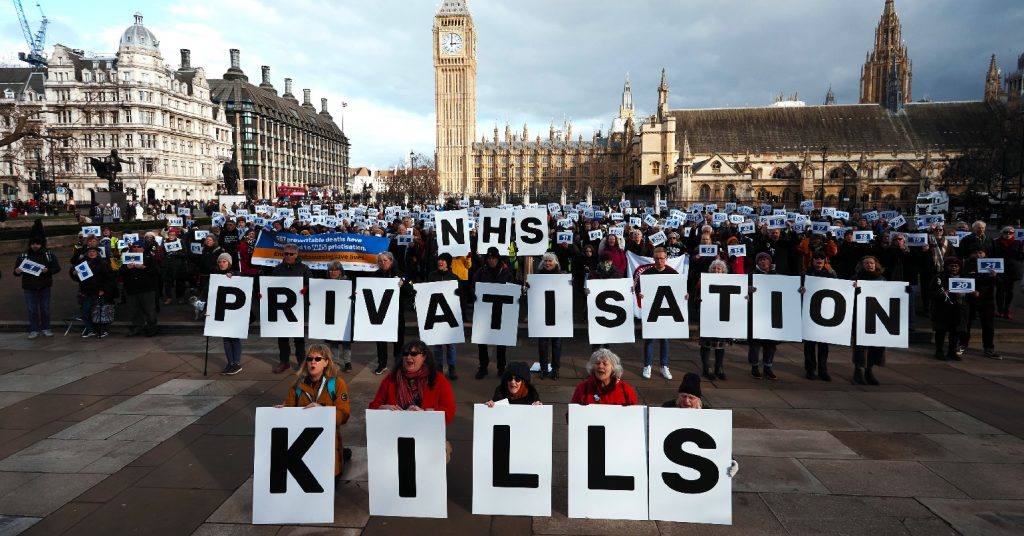New poll: mass support for public ownership
Privatisation is unpopular, a failure, and being rejected across the Western world. That’s the finding of a major report from the new campaign group ‘We Own It‘, which calls for a new public service users’ bill.
The report draws on a poll the organisation commissioned from Survation, and gives a wealth of academic studies and examples from around the world. It makes for interesting reading.
Public opinion is against privatisation
60% of voters, for example, believe that “local and national government should run public services in the public sector as the default, and only consider contracting out if this fails”, whilst only 28% believe the private sector should be the first choice. 54% believe that the public sector is more accountable because of democratic structures, whilst only 29% believe that the ability to terminate contracts makes the private sector more accountable.
The poll shows that voters across parties and across the country support public ownership of public services rather than privatisation. Despite 30 years of politicians from Labour, Tories and Lib Dems trying to convince the public that the private sector is best, people aren’t convinced.
There are also some questions asking opinions on policies which perhaps seem like common sense. At a first reading, I wasn’t surprised to see mass support. For example:
– Only 8% disagree with the statement that “when a public service is put out to tender, there should always be an in-house bid to see if the service could be provided publicly at better value” – with 80% agreeing, and 12% not expressing an opinion.
– 79% believe there should always be a consultation before a service is privatised or outsourced.
– 88% agreed that “the government be required to end the contracts of private companies early, when they are found to be doing a poor job of running public services, following public complaints”.
– 81% “support the establishment of a public body to hold to account private companies that provide public services, summon their executives for questioning, scrutinise their performance and impose penalties when they are failing”.
These things all sound like obviously good ideas, and it seems most people agree: a huge majority of supports each of them. However, what is remarkable is that these astonishingly popular common sense ideas haven’t been enacted.
All three of Britain’s biggest parties have been in government in the last five years. All of them have outsourced services and sold off assets. None of them have introduced any of these proposals.
Across the Western world, services are being brought back into public ownership
As well as publishing the results of this poll, the report also busts the myth that privatisation is the normal travel of direction in the modern world. In the USA, 1/5 of services previously outsourced have been taken back into public hands in recent years, and the Obama administration is currently looking at de-privatising many more. Likewise, taking case studies from across Europe, the research shows numerous succesful examples of services being taken from private to public hands in recent years. For example:
“In GERMANY, the last few years have seen a major expansion in direct public ownership of utilities, away from the four major multinational firms dominating the electricity sector. By 2011 the majority of energy distribution networks had returned to public ownership, while nearly 1,000 local public utilities now account for almost 10% of electricity generation.
“Many German public authorities are bringing services such as waste disposal, public transport, water, social care, social housing back in-house, not only to give better value for money, but to help meet important social and environmental objectives.” (from ‘Better in Public Hands’ by We Own It)“In FRANCE, three-quarters of the water services used to be run by huge private companies, but now an increasing number of towns and cities have opted for public ownership after years of rising prices, mismanagement and accountability problems. Paris itself decided to remunicipaise its water service in 2010, under a new publicly owned company, Eau de Paris, for water distribution to over 2 million people. The remunicipalisation has led to more control and oversight from the regional authority and representatives of water users, improved water quality and lower prices.” (From ‘Better in Public Hands’)
This again is an interesting and useful point. The right rarely actually argues for privatisation. It more often implies that it is a part of the inevitable march of history. As the report reminds us, the truth is much more complex – we are, we could argue, in the middle of a wave of across the world of people taking services back into public ownership.
These two examples also highlight a different and important point – public ownership means more than nationalisation. Case studies from Finland, the Netherlands, Belgium and Newcastle show that there are lots of different models of public ownership, which can succeed in making services more efficient, more accountable, and saving the public money.
Privatisation doesn’t work
Finally, though the report doesn’t do new primary research into the efficacy of privatisation, it does draw together a wide range of studies which have shown that privatisation isn’t the solution we are often told it is. The list of studies is long, but among key findings are:
– Public ownership of water could save the average household in England £80 a year.
– Since going back into public ownership, the East Coast group (who run the East Coat Mainline rail service) is paying more money back to the state than any private operator ever has and is performing better than it ever did when it was privately run.
– A report on outsourcing by the Working Lives Research Institute found that “The potential risks are substantial. The potential benefits unproven.”
– A Europe-wide study for the European Commission found ‘service provision should not be left to the “free” play of market forces’ and says ‘public ownership combined with new forms of service users’ participation’ is viable and efficient.
Politics isn’t about evidence
Despite all of this, the government is rapidly privatising services. It is not taking any of the measures asked about in the poll to make outsourced services accountable, or to give the public sector a chance to bid. The best available evidence shows that what it is doing is opposed by almost everyone in the country and that it is likely to lead to worse service delivery and higher costs. And they are doing it despite the fact that there are plenty alternative models demonstrated across Europe and the world.
All of this reminds me of an important lesson. Politics isn’t about evidence, truth, or facts. It’s about power. And those who benefit from privatisation are very rich and powerful. Whilst privatisation isn’t working for most people, it is working very well for those to whom services are privatised, with reports of profits and executive salaries from former utility companies now a regular feature in our news cycle.
In our political system, the public does have some power. But we only have enough to beat that of the very wealthy when we organise.
A public service users bill
The report is demanding a Public Service Users’ Bill, whose provisions I’ve copied below. This seems like an easy and sensible first step. Though I would like to go much further, it’s a measure I can see even Labour and the Lib Dems supporting. Let’s try to make them.
The proposed bill would do the following:
The people who use public services must have a look-in when it comes to how our public services are run. A Public Service Users Bill would protect and promote the high quality, accountable services that we all need:
• Public ownership would be prioritised as the default option that is looked at first, before contracting out (supported by 60% of the public). Local and national government would always explore best practice public ownership, before turning to private companies.
• There would always be a realistic, thorough in-house bid from the public sector whenever a public service – local or national – is put out to tender (supported by 80% of the public).
• Organisations with a social purpose – the public sector and genuine cooperatives, mutuals, charities and social enterprises – would be prioritised in the tendering process (supported by 57% of the public).
• The public would be consulted and its views thoroughly considered before any service is privatised or outsourced (supported by 79% of the public).
• The public would be properly consulted about the services they receive through public service contracts.
• The public would have a ‘right to recall’ private companies who are doing a bad job (supported by 88% of the public).
• Private companies running public services would be transparent about their performance and financial data – as in the public sector (supported by 88% of the public).
• Private companies running public services would be subject to Freedom Of Information legislation – as in the public sector (48% of the public mistakenly believe this is already the case).”



Fine. But should include a duty on the public bodies to hold regular reviews involving the public of the services they contract out, not leave it to the companies’ own reporting.